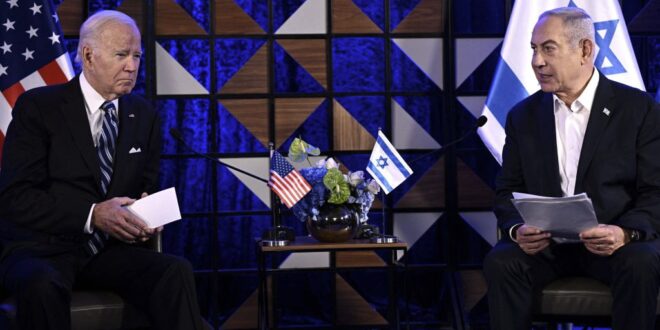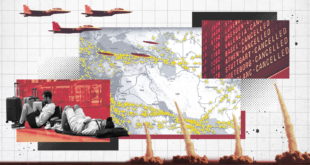Netanyahu’s resolve in the face of so many challenges, from splits in his own war cabinet over the conduct of the war in Gaza to incessant pressure from Washington to agree to a ceasefire, has prompted comparisons with British wartime leader Sir Winston Churchill, with Andrew Roberts labelling the Israeli PM “The Winston Churchill of the Middle East.”
There is massive evidence that the Biden administration would like to see Netanyahu removed and that someone more “compliant” to the wishes of the US replace him – a new Israeli prime minister who would not object to Hamas continuing to rule the Gaza Strip after the fighting ends, and rebuild its military to be able to attack Israel again as it has vowed to do. The US would also doubtless like an Israeli prime minister would gladly accept a Palestinian state supervised by Qatar, which has a regrettable but endless track record of promoting and sponsoring terrorists. The Biden administration would apparently like an Israeli prime minister who would agree that a nuclear-armed Iran is exactly what the Middle East needs at this time, and, to that end, has been begging European officials not to object to Iran’s nuclear program.
If the Israelis are smart, they will keep Netanyahu. He has shown time and again that he can stand up to immense pressure from whoever is trying to insert a knife in Israel’s back – whether the Obama administration proposing an Iranian nuclear bomb in 2015, or Senator Chuck Schumer and President Joe Biden’s unsubtle efforts to try to get him ousted.
Unfortunately, the only way of seeing all the hostages released is by military pressure.
To prevail against determined terrorist organisations like Hamas and Hezbollah, Israel and its allies need to rally support for Netanyahu, rather than constantly criticize him.
For only by defeating these deadly Iran-backed terrorist groups can there be any realistic chance of peace.
With Hamas facing the prospect of suffering a cataclysmic defeat in Gaza, the recent upsurge in attacks on northern Israel by Hezbollah, from Lebanon, suggests that Iran is determined to open a second military front to distract attention away from Hamas’s dire plight, and to further the plan of its patron, Iran, to try to annihilate Israel.
Iran’s support for Hamas was crucial to enabling the terrorist organisation to carry out its murderous assault against southern Israel on October 7. Apart from providing valuable intelligence on the Israel Defence Forces’ (IDF) key positions along the Gazan border, Iran was the main provider of the weaponry used to conduct the atrocities.
After Iran launched its first direct attack, from its own soil, against Israel in April, when most of the Iranian missiles and drones were intercepted before reaching their targets, Iran’s options have become increasingly limited for providing assistance to its long-standing ally Hamas, as well as to its wish to exterminate Israel.
The prospect of the Gaza conflict ending with the complete destruction of the Iranian-backed terrorist group Hamas is viewed with alarm in Tehran, which remains committed to maintaining its support for the so-called “axis of resistance”, the collection of Islamist terrorist groups that includes Hamas and Hezbollah in Lebanon.
The steady erosion of Hamas’s ability to maintain its terrorist operations was highlighted at the weekend, when the IDF staged a daring rescue mission to free four Israeli hostages being held by the terror group in the Gaza district of Nuseirat.
With Hamas set to suffer a catastrophic defeat in Gaza at the hands of the IDF, Iran is clearly seeking to ease the pressure on its terrorist ally by provoking Israel into opening a second front by counterattacking more aggressively against Hezbollah in Lebanon.
This would explain the recent upsurge in attacks against northern Israel by Hezbollah terrorists in recent weeks. According to Israel’s Shin Bet domestic intelligence service, Hezbollah launched more than 1,000 anti-tank missiles, rockets and drones against northern Israel — in a country smaller than New Jersey — during May. This compares with 334 in January and 534 in February, whilst in both March and April, there were more than 740.
The frequency of the attacks is having an increasingly difficult impact on Israelis living close to the border area, who are enduring almost daily bombardments, with Israeli officials claiming that nearly 5,000 projectiles have been launched towards Israel from Lebanon since the start of the war in Gaza.
At least 100,000 Israelis are estimated to have fled their homes in northern Israel since Hezbollah launched its attacks following Hamas’s invasion on Israel on 7 October, and are living as displaced persons is temporary lodgings.
In the past week, the intensity of the attacks has led to Hezbollah rockets sparking a series of wildfires in northern Israel, with Israeli firefighters battling to contain the blazes, which have been exacerbated by high temperatures. More than 3,500 acres of land have been destroyed so far.
The use of Iranian-made drones in the attacks, moreover, signifies that Hezbollah is using more sophisticated methods to attack Israel’s northern border, which Hezbollah officials insist will continue until there is a ceasefire in Gaza. They see to be hoping either to destroy Israel without being harmed themselves, or that that someone else will please stop the war that they began.
The upsurge in violence has increased the pressure on Israeli Prime Minister Benjamin Netanyahu to take firm action against the mounting threat Hezbollah poses to Israelis. Last week, an Israeli army reservist was killed and at least ten people wounded in a Hezbollah drone attack on the Druze village of Hurfeish in the Upper Galilee.
After conducting a personal tour of the region, Netanyahu warned that Israel was ready with an “extremely powerful” response if Hezbollah persisted with its attacks.
Netanyahu’s willingness to give serious consideration to opening a second front in Israel’s war against Iranian-backing terrorists is a measure of his utter determination to emerge victorious in his pledge to utterly destroy Hamas.
Netanyahu’s resolve in the face of so many challenges, from splits in his own war cabinet over the conduct of the war in Gaza to incessant pressure from Washington to agree to a ceasefire, has prompted comparisons with British wartime leader Sir Winston Churchill, with Andrew Roberts labelling the Israeli PM “The Winston Churchill of the Middle East.”
There is massive evidence that the Biden administration would like to see Netanyahu removed and that someone more “compliant” to the wishes of the US replace him – a new Israeli prime minister who would not object to Hamas continuing to rule the Gaza Strip after the fighting ends, and rebuild its military to be able to attack Israel again as it has vowed to do. The US would also doubtless like an Israeli prime minister would gladly accept a Palestinian state supervised by Qatar, which has a regrettable but endless track record of promoting and sponsoring terrorists. The Biden administration would apparently like an Israeli prime minister who would agree that a nuclear-armed Iran is exactly what the Middle East needs at this time, and, to that end, has been begging European officials not to object to Iran’s nuclear program.
If the Israelis are smart, they will keep Netanyahu. He has shown time and again that he can stand up to immense pressure from whoever is trying to insert a knife in Israel’s back – whether the Obama administration proposing an Iranian nuclear bomb in 2015, or Senator Chuck Schumer and President Joe Biden’s unsubtle efforts to try to get him ousted.
While the IDF’s successful operation to rescue four Israeli hostages held by Hamas in Gaza will have boosted Netanyahu’s claim that his uncompromising approach to defeating Hamas is paying dividends, the pressure on him both to accept a ceasefire — an agreement he argues would simply reward Hamas for conducting its horrific terrorist attacks on October 7 — and hold off from launching military action against Hezbollah remains strong.
Unfortunately, the only way of seeing all the hostages released is by military pressure.
The UN Security Council’s backing for a US resolution setting out a ceasefire plan for the war in Gaza will lend encouragement to US Secretary of State Antony Blinken’s latest diplomatic efforts to persuade Israel and Hamas to a temporary cessation of hostilities, which none of the parties, save Biden, remotely wants.
In his eighth diplomatic mission to the region since the October 7 attacks, Blinken is urging top Israeli officials to accept and implement a plan for postwar Gaza, while at the same time pushing for more international pressure on Hamas to accept a temporary ceasefire, which is not at all what Hamas wants. Like Iran, Hamas is looking for a saviour to permanently end the conflict it began so that it can go back to ruling Gaza and rebuilding its military to strike Israel again.
At the same time, Blinken is also trying to cut his own separate deal with Hamas to release just the American hostages — a plan that not only double-crosses Israel, but also undercuts his own proposal at the UN.
Meanwhile, Washington is urging the Israeli government to limit its response to Hezbollah’s constant attacks against Israel’s northern border, with the Biden administration claiming that neither a “limited war” in Lebanon nor a “small regional war” are realistic options in dealing with Hezbollah, and that any escalation in Israel’s military response could result in further involvement by Iran.
On both these issues — calling for a ceasefire and limiting Israel’s response to Hezbollah — the Biden administration needs a reality check on what is really taking place on the ground on Israel’s northern and southern borders.
The fact that the freed Israeli hostages were being held by Hamas in a densely populated neighbourhood in Gaza area shows the lengths the terrorists are prepared to go to withstand Israel’s military assault in the hope that they can use the remaining hostages as a bargaining chip to obtain favourable ceasefire terms.
As for the risk of Iran deepening its involvement in the conflict, that has already happened, as the recent increase in Hezbollah attacks on Israel has demonstrated.
To prevail against determined terrorist organisations like Hamas and Hezbollah, Israel and its allies need to rally support for Netanyahu, rather than constantly criticize him.
For only by defeating these deadly Iran-backed terrorist groups can there be any realistic chance of peace.
 Eurasia Press & News
Eurasia Press & News



